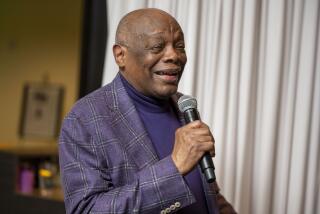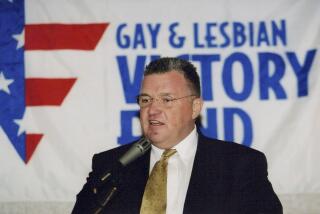Column: Democratic icon Barney Frank on Congress, gay rights and partisan echo chambers
If C-SPAN were Nielsen rated, the quick-draw wit and rhetoric of Rep. Barney Frank (D-Mass.) might have been boffo. The highest profile gay member of Congress retired in 2013 after 32 years, leaving a legacy of legislation on financial reform as well as changes in perceptions and laws about homosexuality. Frank has launched into his “civilian” life with a memoir, “Frank: A Life in Politics from the Great Society to Same-Sex Marriage.” And as always, he is what his name says.
Gay rights were once reviled publicly, and Congress was revered. How did those attitudes flip?
In my last years in government, marrying Jim and becoming the first member of Congress to have a same-sex marriage did much better at the polls than the fact I cosponsored the financial reform bill!
The biggest single reason — we stopped hiding, we began to tell people who we were, and the mistaken view of us just dissolves. There were all these predictions about what a negative impact same-sex marriage would have, and there was no negative impact. I think you’ll see the same trajectory with legalizing marijuana.
With regards to government, beginning in the 1970s, the world’s economic situation shifted to the disadvantage of many working Americans, white males in particular, who didn’t have technical skills and higher education. Working people who believed government would be doing things to help them got very angry because government wasn’t helping them. In the minds of many, the government was helping black people, gay people, feminists.
Government could have done better. The danger to the public weal is this vicious cycle: People get angrier and angrier at government, then they elect people who are also angry at government, then government does even less. To break out of this we need to show them government will help: reducing medical care costs, helping them get to college, raising the minimum wage. We need to get some money — because you can’t raise taxes in this period — to do these things. That’s why I propose substantial reductions in military spending and legalizing drugs, to save all kinds of money.
Americans also seem to resent the idea of a professional political class.
The first political class we had were a bunch of professional politicians named Jefferson, Madison, Adams, Monroe. Those people spent their whole lives in politics. It’s a myth that the Founding Fathers just wanted to go back to the farm. They were all career politicians.
You You decided to go into politics after watching the Army-McCarthy hearings on TV in 1954; you were 14.
The Emmett Till murder motivated me, but the hearings made me think, I could be good at that. I’d learned that I was very quick on the verbal uptake and could use humor, so I could see myself being effective in that setting.
You believe politics should be pragmatic, but some politicians refuse to compromise.
They’re more of a factor in the Republican Party than in the Democratic Party now. That’s not always been the case. The nearest case of that [on the left] was Ralph Nader [with his candidacy] helping elect George Bush in 2000. You have some of that now with people trying to get Elizabeth Warren to run for president when she has quite sensibly said no. I think she’s great; I think she correctly understands if she were to run for president, it would detract from her ability to have an impact. People would say, “Oh, she’s just doing this or that for political gain.”
With the financial crisis in 2008, we engaged in some of the most serious bipartisanship since World War II. But with the angriest conservative faction taking over the Republican Party in 2009, it’s become the party the furthest from the center in American history, or [at least since] the Civil War. That’s what’s broken things down — a dominant element that does not believe in compromise, that does not believe government is a good thing. And if you think government does more harm than good, then you don’t worry about the government not doing anything.
Congress is not an autonomous mechanism. What goes on in Congress is a consequence of how people vote or don’t vote.
You discovered other issues that split Democrats, too.
There are people who are so angry that they let their emotions dictate what they do, rather than their intellects. I agree with much of what Occupy was calling for, not all of it. But they were so interested in just expressing their emotions they rejected even the notion that you should be strategic about [how] to bring about change.
There’s an attitudinal problem on some environmental issues. I don’t think the endangered species issue should be an absolute. I don’t think projects that would bring great economic benefit to people should be absolutely vetoed because a particular species would be endangered.
You endorsed some Republicans over Democrats in the past, like Massachusetts Sen. Edward Brooke in 1978, but not recently.
By the 1980s, they had moved too far to the right. I asked Ed Brooke [later] to help me on some issue he had pushed, and he said, “Oh, Barney, I wish I could. That’s not my party any more.”
Now, influential people are less able to influence each other because of the ideologues, the Internet. Ron Paul and I had worked together on a number of things, and I approached him in early 2012 on some marijuana issue, and he said, “I can’t do it now, Barney. My people tell me you [Democrats] are killing me in Iowa.” My very good working relationship with him was constrained by his need to appeal to the people in his own party.
The truism is that Republicans are better at messaging than Democrats — like the phrase “death taxes,” which suggests that everyone who dies is taxed, not just the very richest Americans.
I don’t think they’re better. I think they’re selling an easier case. They’re telling people what they want to hear. [People say] Ronald Reagan was a genius — it doesn’t take a genius to tell people, if I cut your taxes, we’ll be able to work for you.
How do you critique President Obama’s relationship with Congress?
He created some unrealistic expectations; he believed that he would be able to work with Republicans. I was convinced that wasn’t going to work out. When he said he was going to be post-partisan, I said he was giving me post-partisan depression. The notion that things haven’t gone better with Congress because he hasn’t schmoozed with them is simply wrong. Lyndon Johnson had a great 1965 in Congress, but by 1967 he had no influence. The view that the president is responsible for the deadlock because he did not use enough charm is nonsense.
Why are campaigns less about governing than gotchas?
The most active people in politics now live in parallel, separate media universes, and that makes it hard for politicians to cooperate. Activists on the left and right — more on the right than the left — listen only to themselves and each other. They’re thoroughly convinced they’re the true majority, and any politician who doesn’t give them 100% of what they want must be selling out. In 2009, when we told people we didn’t have the votes for single payer healthcare, [some liberals] didn’t believe us. They said, “Everybody I know is for single payer!” The right wing has a similar problem with immigration: They believe everyone in the country wants to kick ‘em all out because everything they hear on the Internet, on Fox News, tells them they’re right.
What part did humor play in your career?
It made me more likable, and being likable is important. There are elements of my personality that are not likable. I get angry and argumentative. The fact that I like to be funny helped me electorally. With Congress, there’s this constant noise level and people would tell me that when I got on the floor to speak, they would say, “Wait a minute, let’s hear what he has to say.” I tried not to make the kind of routine speeches other people made. And people don’t like to be ridiculed, to be made fun of, and I think that factor gave me an edge in some debates.
This interview has been condensed and edited.
Twitter: @pattmlatimes
Follow the Opinion section on Twitter @latimesopinion and Facebook
More to Read
A cure for the common opinion
Get thought-provoking perspectives with our weekly newsletter.
You may occasionally receive promotional content from the Los Angeles Times.







